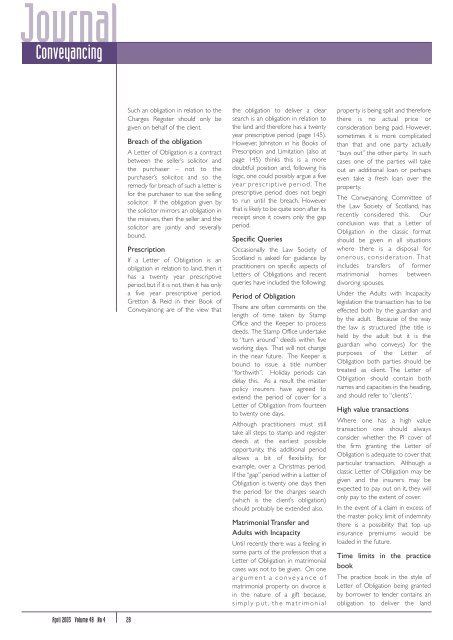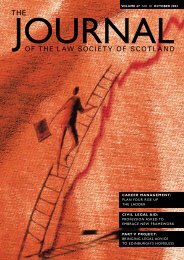Law Society of Scotland - The Journal Online
Law Society of Scotland - The Journal Online
Law Society of Scotland - The Journal Online
Create successful ePaper yourself
Turn your PDF publications into a flip-book with our unique Google optimized e-Paper software.
<strong>Journal</strong><br />
Conveyancing<br />
April 2003 Volume 48 No 4 28<br />
Such an obligation in relation to the<br />
Charges Register should only be<br />
given on behalf <strong>of</strong> the client.<br />
Breach <strong>of</strong> the obligation<br />
A Letter <strong>of</strong> Obligation is a contract<br />
between the seller’s solicitor and<br />
the purchaser – not to the<br />
purchaser’s solicitor, and so the<br />
remedy for breach <strong>of</strong> such a letter is<br />
for the purchaser to sue the selling<br />
solicitor. If the obligation given by<br />
the solicitor mirrors an obligation in<br />
the missives, then the seller and the<br />
solicitor are jointly and severally<br />
bound.<br />
Prescription<br />
If a Letter <strong>of</strong> Obligation is an<br />
obligation in relation to land, then it<br />
has a twenty year prescriptive<br />
period, but if it is not, then it has only<br />
a five year prescriptive period.<br />
Gretton & Reid in their Book <strong>of</strong><br />
Conveyancing are <strong>of</strong> the view that<br />
the obligation to deliver a clear<br />
search is an obligation in relation to<br />
the land and therefore has a twenty<br />
year prescriptive period (page 145).<br />
However, Johnston in his Books <strong>of</strong><br />
Prescription and Limitation (also at<br />
page 145) thinks this is a more<br />
doubtful position and, following his<br />
logic, one could possibly argue a five<br />
year prescriptive period. <strong>The</strong><br />
prescriptive period does not begin<br />
to run until the breach. However<br />
that is likely to be quite soon after its<br />
receipt since it covers only the gap<br />
period.<br />
Specific Queries<br />
Occasionally the <strong>Law</strong> <strong>Society</strong> <strong>of</strong><br />
<strong>Scotland</strong> is asked for guidance by<br />
practitioners on specific aspects <strong>of</strong><br />
Letters <strong>of</strong> Obligations and recent<br />
queries have included the following:<br />
Period <strong>of</strong> Obligation<br />
<strong>The</strong>re are <strong>of</strong>ten comments on the<br />
length <strong>of</strong> time taken by Stamp<br />
Office and the Keeper to process<br />
deeds. <strong>The</strong> Stamp Office undertake<br />
to “turn around” deeds within five<br />
working days. That will not change<br />
in the near future. <strong>The</strong> Keeper is<br />
bound to issue a title number<br />
“forthwith”. Holiday periods can<br />
delay this. As a result the master<br />
policy insurers have agreed to<br />
extend the period <strong>of</strong> cover for a<br />
Letter <strong>of</strong> Obligation from fourteen<br />
to twenty one days.<br />
Although practitioners must still<br />
take all steps to stamp and register<br />
deeds at the earliest possible<br />
opportunity, this additional period<br />
allows a bit <strong>of</strong> flexibility, for<br />
example, over a Christmas period.<br />
If the “gap” period within a Letter <strong>of</strong><br />
Obligation is twenty one days then<br />
the period for the charges search<br />
(which is the client’s obligation)<br />
should probably be extended also.<br />
Matrimonial Transfer and<br />
Adults with Incapacity<br />
Until recently there was a feeling in<br />
some parts <strong>of</strong> the pr<strong>of</strong>ession that a<br />
Letter <strong>of</strong> Obligation in matrimonial<br />
cases was not to be given. On one<br />
argument a conveyance <strong>of</strong><br />
matrimonial property on divorce is<br />
in the nature <strong>of</strong> a gift because,<br />
simply put, the matrimonial<br />
property is being split and therefore<br />
there is no actual price or<br />
consideration being paid. However,<br />
sometimes it is more complicated<br />
than that and one party actually<br />
“buys out” the other party. In such<br />
cases one <strong>of</strong> the parties will take<br />
out an additional loan or perhaps<br />
even take a fresh loan over the<br />
property.<br />
<strong>The</strong> Conveyancing Committee <strong>of</strong><br />
the <strong>Law</strong> <strong>Society</strong> <strong>of</strong> <strong>Scotland</strong>, has<br />
recently considered this. Our<br />
conclusion was that a Letter <strong>of</strong><br />
Obligation in the classic format<br />
should be given in all situations<br />
where there is a disposal for<br />
onerous, consideration. That<br />
includes transfers <strong>of</strong> former<br />
matrimonial homes between<br />
divorcing spouses.<br />
Under the Adults with Incapacity<br />
legislation the transaction has to be<br />
effected both by the guardian and<br />
by the adult. Because <strong>of</strong> the way<br />
the law is structured (the title is<br />
held by the adult but it is the<br />
guardian who conveys) for the<br />
purposes <strong>of</strong> the Letter <strong>of</strong><br />
Obligation both parties should be<br />
treated as client. <strong>The</strong> Letter <strong>of</strong><br />
Obligation should contain both<br />
names and capacities in the heading,<br />
and should refer to “clients”.<br />
High value transactions<br />
Where one has a high value<br />
transaction one should always<br />
consider whether the PI cover <strong>of</strong><br />
the firm granting the Letter <strong>of</strong><br />
Obligation is adequate to cover that<br />
particular transaction. Although a<br />
classic Letter <strong>of</strong> Obligation may be<br />
given and the insurers may be<br />
expected to pay out on it, they will<br />
only pay to the extent <strong>of</strong> cover.<br />
In the event <strong>of</strong> a claim in excess <strong>of</strong><br />
the master policy limit <strong>of</strong> indemnity<br />
there is a possibility that top up<br />
insurance premiums would be<br />
loaded in the future.<br />
Time limits in the practice<br />
book<br />
<strong>The</strong> practice book in the style <strong>of</strong><br />
Letter <strong>of</strong> Obligation being granted<br />
by borrower to lender contains an<br />
obligation to deliver the land










